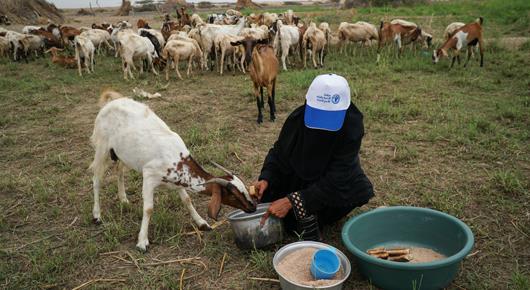Japan boosts FAO’s efforts to reduce acute food insecurity of conflict and Covid-19 affected population in Yemen

8 February 2021- Sana’a - The Government of Japan boosts the Food and Agriculture Organizations of the United Nations (FAO) emergency interventions in Yemen by contributing USD 2 090 909 allocated as part of its ongoing response in Yemen.
The “Emergency Agricultural Livelihood Assistance to Conflict and COVID-19 Affected Populations” project enables FAO to provide emergency livelihoods assistance to over 10 650 households (74 550 individuals) of the most nutritionally vulnerable households in the targeted districts in Yemen’s Al Bayda and Al Dhale’e governorates. According to the latest IPC analysis released by FAO and partners over 50 percent of the total population of the two governorates are facing severe acute food insecurity (IPC 3 and above) and feared to slide into famine-like conditions unless humanitarian and livelihood support is urgently provided.
The one-year project will enhance food and nutrition security and strengthen livelihoods in affected districts with high levels of vulnerability that is aggravated due to the impact of COVID-19 through improved home-based food production. This will be achieved through distribution of agricultural inputs and tools, including quality seeds of vegetables and legumes, complemented by training on good agricultural practices. The project will also enhance livestock production in targeted districts through distribution of concentrated animal feed, combined with training on good animal husbandry practices, and enhanced nutrition awareness.
In a press release issued by the Japanese Embassy to Yemen in Riyadh, the embassy stated that “Japan continues to extend its support to the people of Yemen to mitigate their sufferings caused by the humanitarian crisis in the country.”
“The conflict-induced crisis and pandemics such as COVID19 aggravated the food insecurity conditions of thousands of vulnerable Yemeni households and decreased their food production capacity “says Hussein Gadain FAO Representative in Yemen. “Through this generous contribution from the Government of Japan, FAO is expected to enhance the productivity and nutrition security conditions of targeted rural families as well as reduce their risks of sliding further into famine conditions.” He added.
The project will target mainly the most vulnerable farmers, agro-pastoralists and pastoralists in the targeted districts of Al Bayda and Al Dhale’e governorates with a specific focus on female-headed households, households with children under five-years-old, families with pregnant and lactating mothers, as well as elderly and disabled people. Priority will also be given to IDPs and host families.
The women will be empowered within project’s activities as agents of change within their households and communities through an increased role in decision-making, enabling them to provide nutritious diets, as well as supplementary food production, advancing their role as key contributors to Yemen’s rural development.
According to the latest IPC analysis produced by FAO, 16.2 million people in Yemen are facing high levels of acute food insecurity (IPC Phase 3 and above) through June 2021 with 5 million people in acute food insecurity (IPC4) and are expected to slide to catastrophic conditions (IPC5). Agriculture is one of Yemen’s key sectors, providing employment to more than 50 percent of the labour force, and livelihoods for 70 percent of the total population. Over the last three years, FAO and Japan partnered in Yemen to restore affected agricultural livelihoods, enhance local food availability and mainstream the role of women in peacebuilding through a natural resources management.
